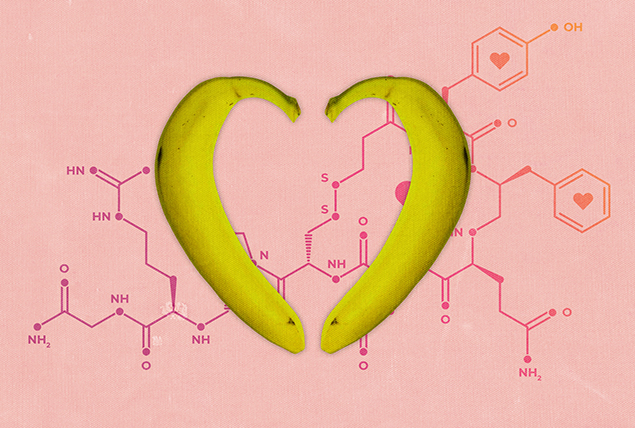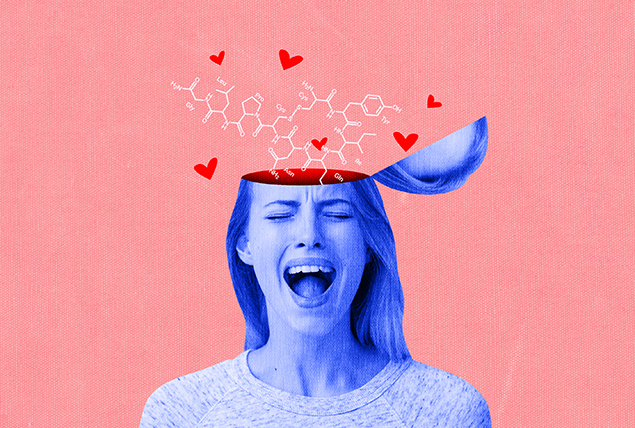What Is Oxytocin's Role in Male Reproductive Health?

If the word "oxytocin" ever comes up in conversation, it's 99 percent likely the phrase "the love hormone" will follow immediately.
It's been a few years since oxytocin was in its pop science heyday. Still, for a while, it was difficult to avoid news stories gushing about oxytocin studies and its effects on love, connection and affection.
To this day, for as little as $79, you can get a vial of something purporting to be a mixture of oxytocin and pheromones in a cologne spray that according to its makers, "inspires a social magnetism and sensuality" and "enhances your attractiveness and others' perceptions of you."
(Tip: That's not really how it works.)
It is true that oxytocin is an important neurochemical messenger strongly associated with our feelings of recognition, trust and romantic connection. It's especially important in childbirth, during lactation, and for building the bond between mother and infant.
What we don't often hear about is the other kind of "loving feeling" oxytocin is associated with: sex.
It turns out that oxytocin plays an important role in male reproduction and sexual response. Find out what oxytocin is, what it does and how it comes into play in male sexuality.
What is oxytocin?
Oxytocin may be associated with pregnancy and bonding between infant and mother, but it's an important hormone for everyone.
"Oxytocin is all over popular news outlets because it's a really sexy hormone to talk about," said Amy Pearlman M.D., a men's health specialist and co-founder of Prime Institute in Fort Lauderdale, Florida. "A lot of people think of oxytocin and females because it's really important when it comes to childbirth and stimulates uterine contractions. But it's important for people of all genders, not just women."
Belonging to a class of hormones called neurohypophysial hormones, oxytocin is produced in the hypothalamus, the part of the brain that controls functions such as body temperature, heart rate and blood pressure. The hypothalamus produces other hormones, such as dopamine, and plays a role in regulating our sense of hunger, thirst, mood, sleep regulation and sex drive.
Once oxytocin is synthesized in the hypothalamus, it is stored in the pituitary gland to be released into the bloodstream. It stimulates the muscles of the uterus to contract when it's time for the baby to be born, helps to move milk from ducts in the breast to the nipple, and contributes to bonding between the mother and infant.
There is some evidence that postpartum depression may be linked to low levels of oxytocin, but we still know relatively little about it compared to other types of hormones.
"We think more of our gonadotropin-type hormones—testosterone, FSH [follicle-stimulating hormone] and LH [luteinizing hormone]—and we've worked with those for a long time, both for fertility purposes and with testosterone for sexual function," said Katherine Rotker, M.D., a urologist with Yale Medicine in New Haven, Connecticut, who specializes in male infertility and reproductive health.
"But there are a lot of these neurotransmitter-type hormones, oxytocin being one, that I think we're learning more and more how they're related and what they do for us in terms of sexual behavior and health," she continued.
Oxytocin and the prostate gland
Oxytocin is linked to male sexuality in intriguing ways. The hormone was long thought of as more of a female hormone in terms of how closely linked it is to childbirth. Research now suggests it may be intertwined in the male reproductive organs more than was previously thought.
Some studies have suggested that oxytocin is produced locally in the prostate gland. It's also believed to be present in the testes and is thought to help regulate the production of testosterone there.
Other animal-based research has suggested that oxytocin levels are higher in dogs with benign prostatic hyperplasia (BPH), an enlarged prostate, suggesting it plays a more important role in prostate health than we fully understand.
One thing we know for sure is that oxytocin plays a role in ejaculation.
At the moment of ejaculation, a flood of oxytocin is released into the bloodstream, which helps to produce the contractions that allow sperm to be released. This could mean a great deal to men who have trouble ejaculating.
"I do have some patients who have issues reaching climax, and we've tried various things," Pearlman said. "And if they're willing to get a little creative, that's where I might use intranasal oxytocin. I would have them do it before sexual activity. I don't have a lot of patients do it, but there's some evidence to support its use. If it doesn't work, fine. But if it does, or it helps a little bit to make it easier, then, hey, that can be a win."
Conclusions
Oxytocin's exact function in terms of male sexual response remains somewhat obscure, but we can say for certain it plays a vital role. As with all bodily functions, keeping the overall machine functioning in a healthy way helps to keep each particular part running smoothly.
"I think the main thing is that hormones are important to every aspect of our lives," Pearlman said. "They impact how we interact with people [and] how we function."
Connecting with people, getting good sleep and treating our bodies well can all help our bodily processes to work better, she concluded.


















